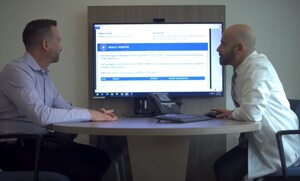EDISON, N.J., March 9, 2020 /PRNewswire/ -- A national medical society on Sunday recognized a study from the JFK Johnson Stroke-HEART™ Trials as the best research published last year in the field's most prestigious journal.
The Hackensack Meridian Health JFK Johnson Rehabilitation Institute research showed that stroke survivors can substantially reduce their chances of dying within the year by completing a comprehensive program of cardiac conditioning and lifestyle counseling.
The Association of Academic Physiatrists (AAP) recognized Co-Principal Investigators Sara Cuccurullo, M.D., and Talya Fleming, M.D., at an international conference in Orlando, Fla. Dr. Cuccurullo is vice president and medical director of the JFK Johnson Rehabilitation Institute and Dr. Fleming is director of the JFK Johnson Aftercare and Stroke Recovery Programs
AAP represents faculty, researchers, and others supporting the advancement of physical medicine and rehabilitation academics. The award was presented at the International Society of Physical and Rehabilitation Medicine (ISPRM) World Congress.
Robert C. Garrett, CEO of Hackensack Meridian Health, said the study is revolutionizing the way the medical community thinks about stroke recovery. "We are so proud of the JFK Johnson Rehabilitation Institute for this award and their groundbreaking research, which may ultimately change the lives of thousands of stroke patients around the world," he said.
"We appreciate this award and hope it brings more attention to our research. Our study shows that a comprehensive stroke recovery program can help stroke survivors live longer, healthier lives," said Dr. Cuccurullo.
The JFK Johnson Stroke-HEART™ Trials set out to determine if cardiac conditioning — similar to what's offered to people recovering from cardiac disease — could improve death rates for survivors of serious strokes.
The study of nearly 800 patients showed that those who completed the JFK Johnson Stroke Recovery Program improved on every one of the measures followed: mortality, cardiac performance, and overall function.
"The Stroke Recovery Program provides the structure to help our stroke survivors adopt behavioral and lifestyle changes to lead healthier lives," said Dr. Fleming.
In a sub-analysis, researchers compared patients of similar gender, age, race and medical complexity and found those who did not complete the program were nine times more likely to die than those who did complete the program.
The cardiac conditioning was modified for stroke patients and used recumbent cross-training bicycles specially outfitted to accommodate paralysis or other symptoms of stroke.
"As physical medicine physicians, we know how to get people with serious neurologic impairment moving," Dr. Cuccurullo said. "There was this thinking that you can't get stroke patients to exercise. But we found that with some modifications stroke patients can exercise safely. And we are finding the benefits to be substantial."
The JFK Johnson researchers knew that patients who participate in cardiac rehabilitation after having heart interventions have a 45 percent lower mortality rate. They wanted to determine if patients with stroke, also a vascular disease, would have similar benefits.
The study followed 783 patients with strokes serious enough to require inpatient rehabilitation. Most patients, 473, chose the traditional standard of care, which may have included physical, occupational and speech therapy, and follow up with their community physician.
The number of patients who choose to participate in the JFK Johnson Stroke Recovery Program was 136. They received 36 sessions of medically monitored interval cardiovascular training — as well as follow-up visits with a Physical Medicine and Rehabilitation physician, psychological, nutritional, educational support and risk factor management, such as smoking cessation. This was in addition to traditional physical, occupational and speech therapy. (Some patients were excluded for various reasons.)
Here's what the study found:
- Of the 473 patients in the standard of care, 60, or 13 percent, died during a median follow up of 85 days.
- In contrast, two of the 136 patients, or 1.47 percent, died during that same time frame.
The contrast of the two groups was so striking the statisticians called to check the numbers, Dr. Cuccurullo recalled.
The Stroke Recovery Program group with a 1.47 percent mortality rate also compares favorably with the national average. According to Get With The Guidelines®-Stroke, a program of the American Heart Association/American Stroke Association, the national unadjusted mortality rate from hospital admission to one-year post-stroke is 31.1 percent.
The value of the program held up when stroke patients of similar gender, age, race and medical complexity were compared.
- Of 66 patients in the matched group who did not participate in the program, 10 died, or 15.2 percent.
- In contrast, of 76 patients in the matched group who completed the program, 1 died, or 1.3 percent.
Dr. Fleming said the response from patients was overwhelmingly positive.
"Many patients told us they did not know where they would be without the program," Dr. Fleming said. One patient described being "unable to talk, walk, or move my arms and legs. ... The Stroke Recovery Program helped me get back to normal."
The study is attracting attention in the field as its being presented at conferences around the nation and internationally. The researchers are continuing the study with larger numbers of patients and also are exploring whether the program reduces hospital re-admissions.
Dr. Cuccurullo and Dr. Fleming also met with officials from the Center for Medicare & Medicaid Innovation. The CMS leaders reacted positively to the program.
"They asked us, 'Why hasn't anyone done this before?'" Dr. Cuccurullo recalled. "The thinking is that stroke patients can't exercise. But we showed that if you accommodate stroke patients you can enable them to complete a comprehensive cardiac conditioning program."
The researchers also hope the study would encourage CMS and other insurers to cover cardiac rehabilitation for stroke patients the same way cardiac rehabilitation is covered for patients with heart disease. They theorize that keeping stroke patients functioning at a higher level will reduce overall health care costs associated with stroke.
"Enabling stroke patients to reduce their chances of a second stroke and having them functioning in the community at a high level is the best outcome for everyone," Dr. Cuccurullo said.
About Hackensack Meridian Health JFK Medical Center
Serving residents of central New Jersey for more than 50 years, JFK Medical Center offers a complete array of advanced services in its 498-bed facility located in Edison, N.J. With more than 1,000 affiliated physicians, this academic medical center offers a complete spectrum of advanced services including general and specialized surgery, cardiac care, maternity and pediatrics, oncology, imaging, breast center, sleep center, wound care, robotic surgery, emergency medicine, weight loss surgery, radiology, long-term care and assisted living. It is home to the world-renowned Neuroscience Institute that diagnoses and treats brain, spine and nervous system disorders. To learn more, visit JFKMC.org.
About Hackensack Meridian Health JFK Johnson Rehabilitation Institute
Offering New Jersey's most comprehensive rehabilitation services, the JFK Johnson Rehabilitation Institute is a 94-bed facility located in Edison, N.J. serving residents of the tristate area for more than 40 years. Its mission is simple: provide quality rehabilitation for adults and children living with disabilities to obtain optimal function and independence within an accepting community. JFK Johnson Rehabilitation has developed programs in specialties that include brain injury, stroke rehabilitation, orthopedics/musculoskeletal and sports injuries, fitness, cardiac rehabilitation, women's health, pediatrics and a prosthetics and orthotics lab. It is the Physical Medicine and Rehabilitation Department of the Hackensack Meridian Medical School at Seton Hall University and Rutgers Robert Wood Johnson Medical School. To learn more, visit JFKJohnson.org.
SOURCE Hackensack Meridian Health

WANT YOUR COMPANY'S NEWS FEATURED ON PRNEWSWIRE.COM?
Newsrooms &
Influencers
Digital Media
Outlets
Journalists
Opted In






Share this article